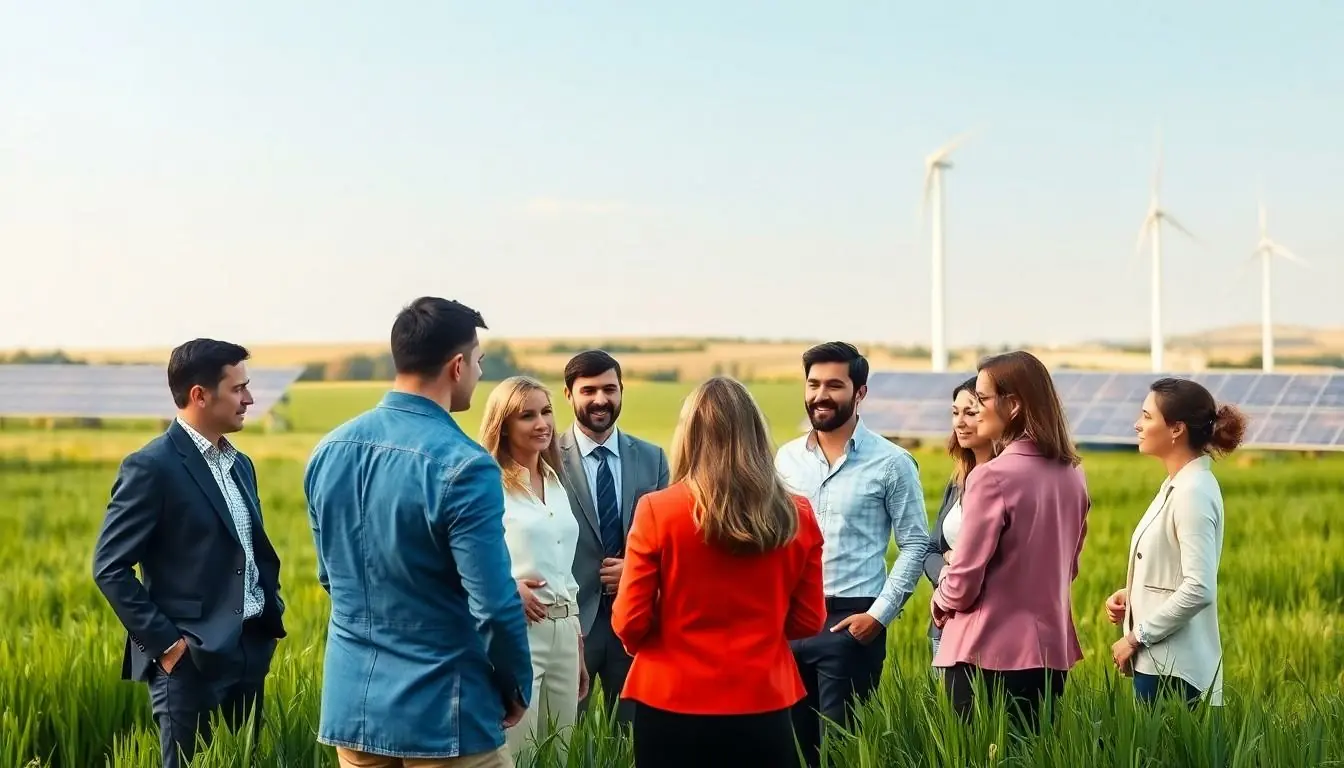In a world where every sunny day feels like a missed opportunity for a solar panel rave, renewable energy procurement is stepping into the spotlight. Companies are no longer just chasing the latest tech gadgets; they’re on a mission to harness the power of the elements—sun, wind, and water. It’s not just about saving the planet; it’s about saving some serious cash while doing it.
Imagine powering your business with energy that’s as clean as a freshly laundered superhero cape. By embracing renewable energy, organizations can boost their bottom line and charm eco-conscious consumers. With options like wind farms and solar arrays popping up like mushrooms after a rainstorm, the time to dive into renewable energy procurement is now. After all, who wouldn’t want to be the hero of their own sustainability story?
Table of Contents
ToggleOverview of Renewable Energy Procurement
Renewable energy procurement involves the strategic acquisition of energy generated from sustainable resources. Companies seek to align their energy purchasing strategies with environmental goals, tapping into solar, wind, and hydroelectric power sources. Effective procurement not only lowers operational costs but also boosts corporate responsibility.
Adopting renewable energy options leads to significant savings. Studies indicate that businesses prioritizing clean energy solutions can reduce energy costs by 30% to 50%. Organizations often secure long-term agreements with energy providers, ensuring stable pricing and supply.
Several factors drive the adoption of renewable energy procurement. Regulatory incentives encourage companies to transition to sustainable energy sources. Financial incentives, such as tax credits and grants, further support the shift toward renewable options. Customers increasingly demand eco-friendly practices, prompting businesses to enhance their sustainability credentials.
Different approaches to renewable energy procurement exist. Power purchase agreements (PPAs) allow companies to buy energy directly from producers, fostering a direct relationship with renewable energy sources. Virtual PPAs provide flexibility, allowing businesses to purchase renewable energy credits without directly linking to specific projects.
Monitoring and reporting energy consumption remains crucial for managing renewable energy initiatives. Data analytics tools enable organizations to assess their energy usage and optimize procurement strategies. This approach ensures companies remain competitive while advocating for environmental sustainability.
Renewable energy procurement represents a strategic initiative where businesses focus on sustainable practices while improving financial performance. Emphasizing clean energy not only aligns with global initiatives but also positions companies as leaders in sustainability.
Importance of Renewable Energy Procurement

Renewable energy procurement plays a crucial role in shaping the future of energy consumption. Companies are increasingly recognizing its significance in achieving sustainability goals and reaping financial rewards.
Economic Benefits
Cost savings represent a primary advantage of renewable energy procurement. Studies show that organizations can reduce energy costs by 30% to 50% through strategic sourcing of renewable resources. Increased stability in energy pricing also contributes to long-term financial planning. Firms achieve budget certainty by locking in rates through contracts like power purchase agreements. Furthermore, adopting renewable energy enhances corporate reputation, attracting environmentally conscious consumers and investors. Businesses find that prioritizing renewable sources can lead to improved profitability.
Environmental Impact
Choosing renewable energy significantly reduces greenhouse gas emissions. Utilizing sources like solar, wind, and hydro creates a cleaner energy mix, mitigating climate change effects. Studies reveal that widespread adoption of renewables could lead to a substantial decrease in carbon footprints across industries. Beyond emissions reduction, companies contribute to local ecosystems by helping to preserve natural resources and biodiversity. Engaging in renewable energy procurement aligns organizations with global sustainability efforts, positioning them as leaders in the transition toward a greener economy.
Types of Renewable Energy Procurement
Companies utilize various methods for renewable energy procurement to align with their sustainability goals. Each approach has unique advantages that cater to different organizational needs.
Power Purchase Agreements (PPAs)
Power Purchase Agreements (PPAs) represent long-term contracts between energy buyers and producers. These contracts typically span 10 to 25 years, allowing companies to secure stable energy prices. Participants often commit to purchasing a specific amount of energy generated from renewable sources, such as solar or wind. Studies indicate organizations can achieve energy cost reductions between 30% to 50% through PPAs. Firms benefit by locking in rates, which enhances predictability in budgeting and overall financial planning. Engaging in PPAs positions companies as leaders in sustainability and boosts their reputation in the marketplace.
Green Tariffs
Green tariffs provide an option for companies to purchase renewable energy through utility providers. This arrangement allows organizations to buy green energy at a premium while remaining connected to the existing grid. Participants typically enjoy assurances that their energy consumption supports renewable projects. Utilities often offer programs catering to large businesses seeking to meet sustainability targets. Using green tariffs can lead to reduced carbon footprints, enhancing a company’s eco-friendly image. Firms gain flexibility in energy management and contribute to the growth of renewable energy within the local community.
On-Site Generation
On-site generation involves companies producing renewable energy directly at their facilities. Methods such as solar panels or wind turbines allow businesses to harness local energy sources. Implementing on-site generation can significantly decrease dependency on external energy suppliers. Organizations enjoy immediate access to clean energy, which reduces operational costs. This approach further enhances energy security and ensures companies gain operational independence. Firms benefit from lower greenhouse gas emissions, promoting their commitment to sustainability while simultaneously reducing energy expenses.
Challenges in Renewable Energy Procurement
Companies face several challenges in renewable energy procurement that can affect their transition to sustainable energy sources.
Regulatory Barriers
Regulatory barriers create complexities in renewable energy procurement. Many regions have inconsistent regulations that complicate the purchasing process. Some organizations encounter difficulties in navigating local laws, which can prevent them from accessing clean energy options. Compliance with various permits and interconnection standards often prolongs project timelines. Furthermore, shifting regulations can alter the economic viability of renewable investments. These hurdles can slow down the adoption of renewable energy, forcing companies to remain reliant on traditional energy sources.
Market Volatility
Market volatility significantly impacts renewable energy procurement decisions. Fluctuations in energy prices can deter organizations from committing to long-term contracts. Changing demand for renewable energy affects market stability, making it challenging to predict future costs or energy availability. Moreover, external factors such as geopolitical events and climate change can induce price spikes. Companies may struggle to maintain budget certainty amid unpredictable market conditions. Addressing these issues requires organizations to diversify their energy procurement strategies to enhance resilience against volatility.
Best Practices for Effective Procurement
Adopting best practices in renewable energy procurement enhances efficiency and fosters sustainability. Strategic planning and collaboration with stakeholders emerge as key elements in this process.
Strategic Planning
Effective procurement starts with thorough strategic planning. Organizations should assess their energy needs and define clear sustainability goals. Analyzing potential energy sources enables leaders to identify the most suitable renewable options. Additionally, understanding regulatory frameworks and financial incentives helps in formulating realistic strategies. Aligning procurement plans with long-term corporate objectives contributes to stability and growth. Finally, incorporating flexibility into strategies prepares companies to adapt to market changes.
Collaborating with Stakeholders
Collaboration with stakeholders is crucial for successful procurement. Engaging internal teams ensures alignment with overall business objectives. Frequent discussions with energy suppliers can lead to better price negotiations and customized solutions. Involving local communities fosters goodwill and promotes sustainable practices. Partnerships with industry peers can share best practices and innovative ideas, enhancing collective impact. Regular communication with regulatory bodies keeps organizations informed about policy changes and upcoming regulations.
Embracing renewable energy procurement is a pivotal step for companies aiming to enhance their sustainability and financial performance. By strategically acquiring energy from sustainable sources, organizations can significantly reduce operational costs while contributing to a healthier planet. This proactive approach not only aligns with corporate responsibility but also meets the growing demand from consumers for eco-friendly practices.
As businesses navigate the complexities of procurement, leveraging diverse strategies and fostering collaboration with stakeholders will be essential. By staying informed about regulatory changes and market dynamics, companies can position themselves as leaders in the transition to renewable energy. Ultimately, the commitment to renewable energy procurement not only benefits individual organizations but also propels the global movement toward a more sustainable future.


